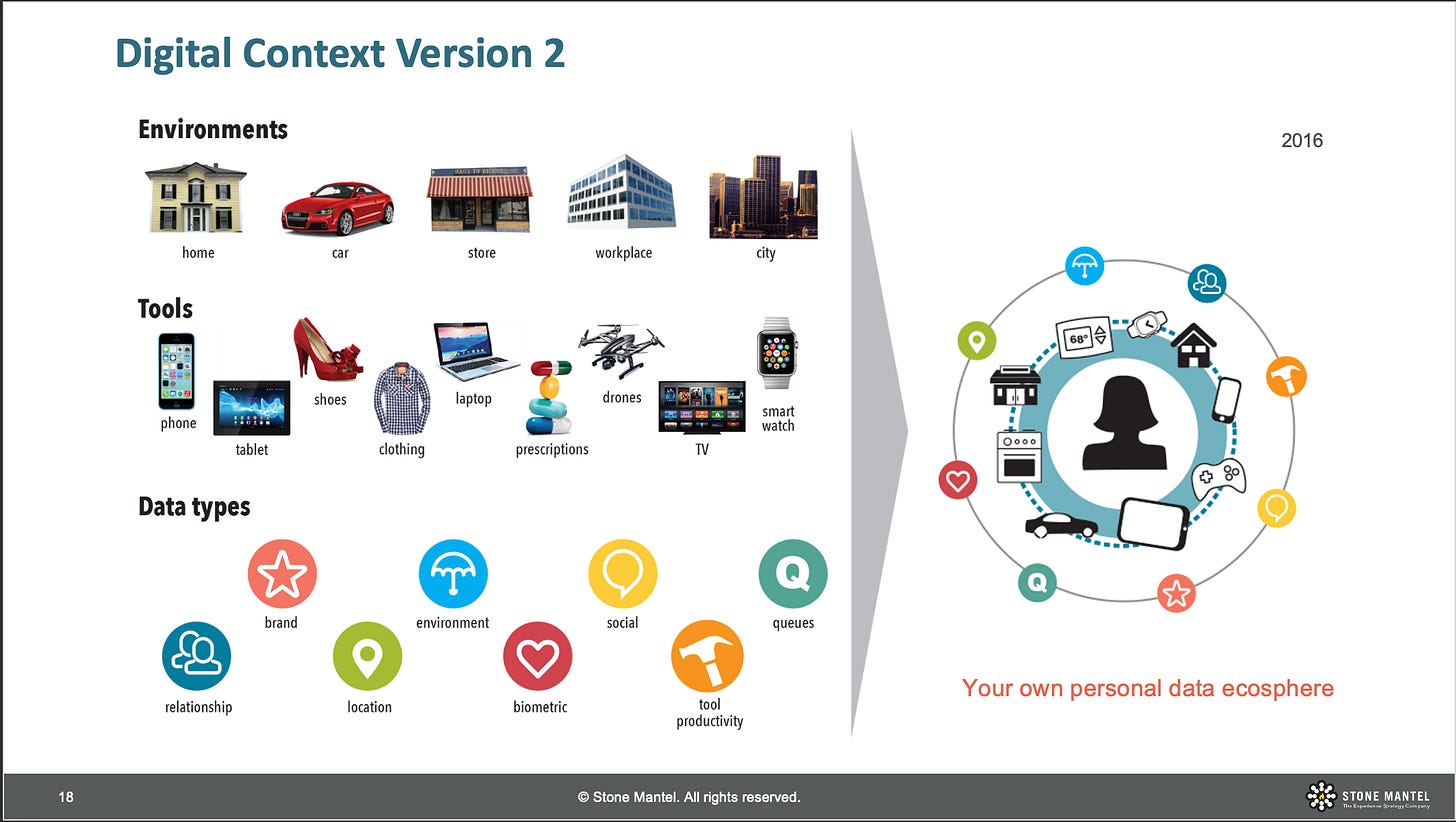What Apple Intelligence Means by 'Personal Context'
And how we predicted the movement toward digital context
Friends,
I was going to post another part of Chapter 2 today, but given Apple’s announcement yesterday, I feel the strong need to write a We-Predicted-That essay instead.
The fact of the matter is, if you didn’t understand the importance of situational markets last week, yesterday should have been a wake up call.
What Apple Intelligence Means by ‘Personal Context’
Yesterday, at WWDC24, Tim Cook laid out Apple’s vision for generative AI. In his introduction, he said that ‘Apple Intelligence’ has to be powerful, intuitive, integrated, and private. “Most importantly, it has to understand you and be grounded in your personal context, like your routine, your relationships, your communications, and more.”
In addition to language, image, and action functionality (what Microsoft, Google, Meta, and OpenAI are doing), Apple is focused on personal context. The platform will look across apps and tools to understand how your situation changes. Then, it will adjust its recommendations across apps to ensure that you arrive on time, contact your family members, get the rest you need, and so on.
Many of you know that I wrote a book in 2015 called Digital Context 2.0, in which I argued that people didn’t want separate channel experiences. Instead they wanted one channel, one tool, one platform that created a personal data ecosphere for them. They wanted ‘digital context.’ I like Apple’s term better. Today, they want ‘personal context.’
Check this out. This is the main visual used to describe how generative AI will work within the Apple ecosphere.
This is the cover of my book:
And this is the way that we illustrate digital context in our Collaborative programs:
Do you see what I see? Apple is describing ‘personal context’ exactly the way that I did nine years ago.
In fact, it was 10 years ago when we in the Stone Mantel Collaboratives discovered the insight about personal context. 2014 program. Great group of companies. We thought that solution providers would use APIs to create contextual platforms. We were studying IOT and AI, but not the generative type.
Just imagine if you were part of the 2014 team who discovered that consumers would demand contextually-aware, situationally responsive solutions. And you executed on the strategies we recommended then. You would be so far ahead of your competition.
Time to Play Catch Up
Yes, I am crowing about our track record of predicting the future. I’m also deeply concerned about how legacy mindsets are slowing companies down.
You know that consumer expectations are already leapfrogging because of generative AI. It’s the experience strategist’s responsibility to see the near future needs of customers and help their company stay ahead of the competition. My whole purpose in writing the Experience Strategy book is to give you the tools you will need for today and for tomorrow.
Here are four of my predictions for what Apple’s personal context efforts will mean for Apple and you:
Apple will have the ability to understand individual customer situations. They will be able to support individuals in very personal ways.
Most other companies will continue to think that what the customer wants is ‘hyper personalization’ by which they mean, ‘an understanding of people’s preferences.’ That is a road to nowhere. It’s ‘extreme who’ strategy and it will mess your business up. (See chapter 2 for dangers of who strategies.)
Apple’s modes capabilities will become far more refined. Right now you can choose between several preset focus modes: personal, work, custom, etc. Great feature. Apple will be able to anticipate what mode you are in from a much more specific group of personal modes.
Companies who don’t support consumer modes will be deselected to show on Apple’s platforms because the companies don’t understand the customer context.
I could go on. But I think you get the point. What we are talking about in the book, the certification program, and the Collaboratives are exactly the things that your company needs to pay attention to in order to compete.
Since I’m feeling once again validated by our research and strategy work, let me make a few more predictions about the next 10 years.
Successful companies will abandon persona segmentation and replace the model with situational analytics.
Successful companies will abandon loyalty as a model and instead study time value to find ways to create more value for customers.
Successful companies will build their brand strategies around their ‘point of view’ about the near future needs of their customers. They will stop worrying about differentiation and instead focus on their predictive abilities.
There will only be a few successful genius platforms that most people will use to manage their daily lives. Many companies will have to find ways to do ‘super smart’ solutioning in order to stay relevant in these platforms.
Place-based experiences are the next big revolution for smart technologies.
Okay, thank you for reading my soapbox. Tomorrow, another installment in Chapter 2.







